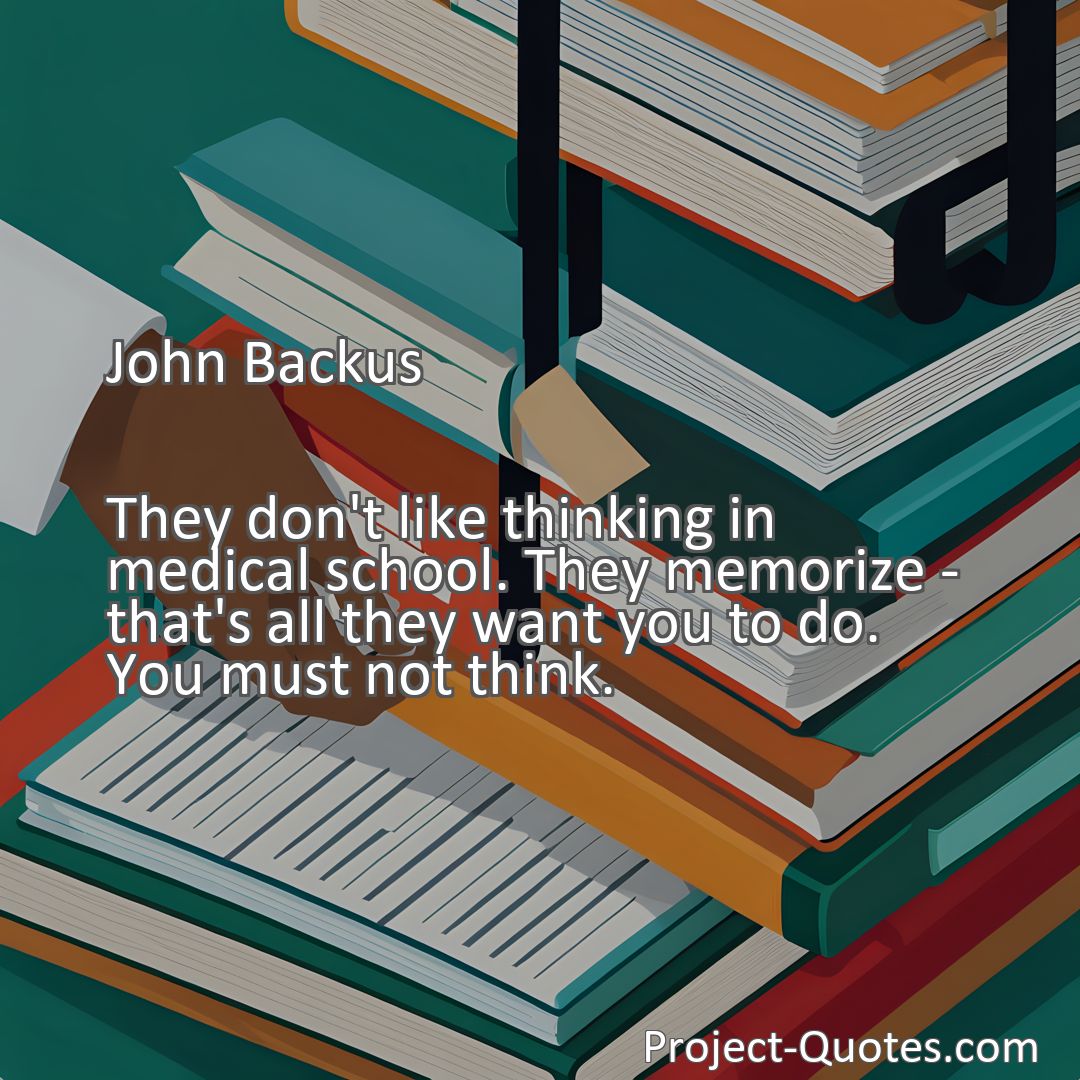They don’t like thinking in medical school. They memorize – that’s all they want you to do. You must not think.
John Backus
In the field of medicine, medical professionals often encounter complex cases that require critical thinking skills. The ability to think beyond memorized facts allows doctors to consider multiple perspectives, ask critical questions, and arrive at accurate diagnoses and treatment plans. Incorporating critical thinking into medical education is crucial to ensure that doctors are well-equipped to navigate the complexities of the profession and provide the best possible care for their patients.
Table of Contents
Meaning of Quote – They don’t like thinking in medical school. They memorize – that’s all they want you to do. You must not think.
Have you ever thought about what it’s like to be a medical student? Well, according to John Backus, it seems that thinking is not the primary focus of their education. In his quote, Backus expresses his belief that medical students are often discouraged from thinking critically and instead are expected to simply memorize vast amounts of information. This perspective raises an important question about the role of critical thinking in education, particularly in a field as demanding and crucial as medicine.
Firstly, let’s delve into the reasons why medical schools may prioritize memorization over critical thinking. One reason could be the immense amount of information that medical students need to grasp. From anatomy and biochemistry to pharmacology and pathology, the sheer volume of knowledge required can be overwhelming. Consequently, it might be more efficient for students to devote their time to memorizing facts and concepts rather than critically analyzing them.
Additionally, the field of medicine demands a high level of accuracy and precision. Mistakes made by doctors can have serious consequences, sometimes even a matter of life and death. This pressure to avoid errors could explain why medical schools emphasize rote memorization. By memorizing established protocols and procedures, students can minimize the risk of making critical mistakes during patient care. Thus, the focus on memorization might be seen as a way to ensure patient safety.
However, one must consider the potential drawbacks of relying solely on memorization. While it is undoubtedly important for medical students to have a strong foundation of knowledge, critical thinking skills are equally vital. Medicine is a constantly evolving field, with new research and discoveries occurring regularly. By relying solely on memorized information, doctors may become outdated in their practices. Critical thinking allows medical professionals to adapt to new findings, evaluate different treatment options, and make informed decisions that are based on evidence and not just rote knowledge.
Furthermore, critical thinking skills are essential for effective problem-solving. Medical professionals often encounter complex cases that require them to think critically and analyze various potential solutions. Without the ability to think beyond memorized facts, doctors may struggle to provide the best possible care for their patients. Critical thinking enables medical professionals to consider multiple perspectives, ask critical questions, and arrive at accurate diagnoses and treatment plans.
In addition to the practical applications, critical thinking skills also contribute to the overall growth and development of medical professionals. The ability to think critically fosters creativity and innovation, qualities that are invaluable in a field where new challenges arise every day. Medical research, for instance, depends on the critical thinking abilities of scientists and physicians to develop groundbreaking advancements in the field. Without these skills, progress would be hindered, and medical knowledge would stagnate.
While it may be true that memorization plays an important role in medical education, it should not be the sole focus. Medical schools should strive to strike a balance between memorization and critical thinking, recognizing the importance of both. Incorporating critical thinking exercises and problem-solving scenarios into the curriculum can help students develop the necessary skills to navigate the complexities of the medical profession.
Moreover, the current advancements in technology and access to knowledge have revolutionized the learning landscape. With the internet at their fingertips, medical students now have easy access to a vast array of information. This shift in access to knowledge allows for a more integrated approach to medical education. Students can leverage online resources and databases to enhance their understanding of concepts, while the classroom and clinical settings can be dedicated to cultivating critical thinking skills and hands-on experiences.
In conclusion, while John Backus may have expressed his belief that medical schools discourage critical thinking and favor memorization, it is essential to recognize that both elements have their place in medical education. Memorization has its merits, particularly in ensuring accuracy and avoiding critical errors. However, critical thinking skills are equally valuable, allowing medical professionals to adapt to new knowledge, solve complex problems, and contribute to the advancement of the field. Striking a balance between memorization and critical thinking is crucial for the future of medicine, ensuring that medical professionals are well-equipped to provide the best possible care for their patients.
I hope this quote inspired image brings you hope and peace. Share it with someone who needs it today!


